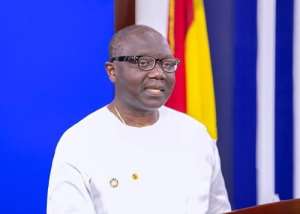
Finance Minister, Ken Ofori-Atta, has announced that existing domestic bonds will be exchanged for a set of four new bonds.
Bonds as of December 1, 2022, that are due for payment will not be paid until at least five years from now.
This is because the new set of four bonds matures in 2027, 2029, 2032 and 2037, the Finance Minister said when he addressed Ghanaians on December 4, 2022.
The interest on these bonds differs as bonds in 2024 will attract an annual coupon of 5%, and that of 2025 will provide 10% interest until maturity.
“Coupon payments will be semi-annual,” the Finance Minister revealed.
Bonds in 2023 will however attract no interest.
According to Mr Ofori-Atta, the adjustment made is as a result of a debt operation programme Ghana would be taking as part of its arrangement with the International Monetary Fund (IMF).
“The broad contours of the Debt Sustainability Analysis has been concluded and I am here this evening to provide some details on Ghana’s Domestic Exchange which will be launched tomorrow,” he said.
He assured that government worked hard to minimize the impact of the domestic debt exchange on investors holding government bonds.
Following government’s intervention, he announced that Treasury Bills would be exempted in the country’s domestic debt exchange and will be paid the full value of their investments on maturity.
“There will be no haircut on the principal of bonds” and “Individual holders of bonds will not be affected,” the Minister added.
On October 30, President Akufo-Addo while addressing Ghanaians on the state of the economy pledged that there would be no haircut on investment.
Mr Ofori-Atta explained that haircut has been taken off the table since “government recognises that our financial institutions hold a substantial proportion of these bonds.”
Meanwhile, the Bank of Ghana, Securities & Exchange Commission, National Insurance Commission and the National Pensions Regulatory Commission will ensure that the impact of the debt operation on the financial institution is minimised.
On the other hand, government is establishing a Financial Stability Fund (FSF) to help provide liquidity support to banks, pension funds, and insurance companies, among others to ensure they are able to meet their obligations to their clients.
Reacting to the news, Vice President of policy think tank IMANI Africa, Bright Simons, stated that Ghana has unilaterally announced a default.
“First time since 1982. In certain like-for-like respects though it is the first since the 1972 commercial loan default,” he tweeted.
He, however, questioned whether the way forward for Ghana with regard to addressing its debt would be a smooth or rough ride.
-The Independent Ghana




 Whoever participated in the plunder of the state must be held accountable – Jane...
Whoever participated in the plunder of the state must be held accountable – Jane...
 A vote for John and Jane is a vote to pull Ghana from the precipice of destructi...
A vote for John and Jane is a vote to pull Ghana from the precipice of destructi...
 I’ll repay your abiding confidence with loyalty, understanding and a devotion to...
I’ll repay your abiding confidence with loyalty, understanding and a devotion to...
 ‘I’ve learnt deeply useful lessons for the future' — Serwaa Amihere breaks silen...
‘I’ve learnt deeply useful lessons for the future' — Serwaa Amihere breaks silen...
 I’m sorry for the embarrassment – Serwaa Amihere apologises for leaked sex video
I’m sorry for the embarrassment – Serwaa Amihere apologises for leaked sex video
 Dumsor: Matthew Opoku Prempeh not in charge of Energy sector – Minority
Dumsor: Matthew Opoku Prempeh not in charge of Energy sector – Minority
 Adu Boahen’s murder: Police arrest house help who was in possession of deceased’...
Adu Boahen’s murder: Police arrest house help who was in possession of deceased’...
 Akufo-Addo nominates Felicia Attipoe as Tema West MCE
Akufo-Addo nominates Felicia Attipoe as Tema West MCE
 Election 2024: I can't have someone I defeated twice as my successor – Akufo-Add...
Election 2024: I can't have someone I defeated twice as my successor – Akufo-Add...
